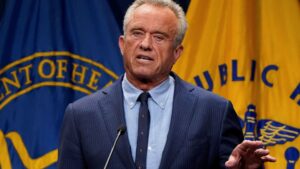A Shift in Vaccine Advisory: Exploring the Controversial New Members on ACIP
In a dramatic turn of events, Health and Human Services Secretary Robert F. Kennedy Jr. has made headlines by appointing eight new members to the Advisory Committee on Immunization Practices (ACIP) following the removal of the entire prior group. This shake-up has sparked intense discussions in public health circles as the new appointees predominantly include well-known critics of vaccines, raising questions about the future of immunization policy and safety in the United States.
Understanding ACIP’s Role
The ACIP plays a crucial role in shaping vaccine policy in the U.S., advising the Centers for Disease Control and Prevention (CDC) on immunization practices. The committee reviews vaccine data, determines eligibility for vaccinations, and makes recommendations regarding insurance coverage. Any recommendations made by ACIP require sign-off from the CDC director before they can become official policy.
The New Faces of ACIP
Among the eight newly appointed advisors is Dr. Robert Malone, a prominent figure in the anti-vaccine movement known for his controversial statements regarding vaccine safety. Kennedy has claimed that these new appointees are "highly credentialed scientists and public health experts," asserting their commitment to evidence-based medicine and common sense.
However, skepticism clouds this assertion. Many public health experts contend that these appointments could compromise the quality and safety of vaccine recommendations. Lawrence Gostin, a professor at Georgetown University, referred to this development as a “national tragedy” that jeopardizes children’s health.
Key Appointees
-
Dr. Robert Malone – Claimed to have contributed to mRNA vaccine technology, Malone has shifted his focus to advocating against vaccine mandates and expressing skepticism about vaccine safety.
-
Dr. Joseph Hibbeln – A psychiatrist and neuroscientist previously linked to nutritional neuroscience at the NIH, Hibbeln’s views on vaccines are relatively less controversial but still raise eyebrows given the mix of new appointees.
-
Dr. Martin Kulldorff – Previously dismissed from Harvard for his pandemic management critiques, Kulldorff has made headlines for his statements against mRNA vaccines.
-
Retsef Levi – A professor at MIT, Levi’s social media posts have been critical of mRNA vaccines, labeling them as harmful.
-
Dr. Cody Meissner – Generally viewed as a more balanced appointment, Meissner has publicly emphasized the importance of vaccinations for children.
-
Dr. James Pagano – An emergency medicine physician, his background in clinical practice offers a practical perspective, although his past affiliations with emergency medicine committees raise questions on advocacy.
-
Dr. Michael Ross – A clinical professor whose background in obstetrics and gynecology could provide valuable insights, though his influence on pediatric policies may be limited.
- Vicky Pebsworth – A nurse with significant public health credentials, Pebsworth has ties to organizations criticized for promoting vaccine misinformation, complicating her role on the committee.
Implications for Public Health
The implications of this new roster are multifaceted. The public health community is divided; while some argue that these changes could lead to less informed recommendations, others believe that diverse opinions may benefit the discourse surrounding vaccination.
Dr. Paul Offit, a well-respected pediatrician, criticized the new appointments, suggesting they are more inclined towards anti-vaccine activism than scientific evidence. He anticipates that the quality of recommendations from ACIP might significantly decline as a result of this shift.
This development raises valid concerns about public trust in vaccine policy and access to accurate health information. The ongoing measles outbreak in the U.S. and unfounded claims about vaccines having dangerous side effects only add to public hesitance.
The Path Forward
At Extreme Investor Network, we emphasize the importance of transparency and balanced communication in public health discourse. As vaccine policy continues to evolve under this new management, staying informed and critically evaluating information from diverse sources is essential for any investor or stakeholder in the health sector.
Our commitment to delivering critical insights and unique analysis distinguishes us from other platforms. We encourage our readers to engage in this conversation, fostering a community that prioritizes accurate, science-based information over sensationalism.
As this story unfolds, we remain dedicated to bringing you timely updates and expert commentary on the implications for the healthcare investment landscape.

